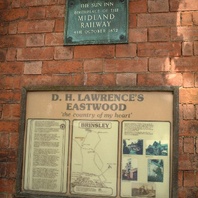
Viking Names
Eastwood
Eastwood, in the Broxtow Wapentake of Nottinghamshire, is a hybrid name formed from Old English east ‘east’ and Old Norse þveit ‘a clearing, a meadow, a paddock’. No form of the name has been found going back to Old Norse austr ‘east’.
Read More
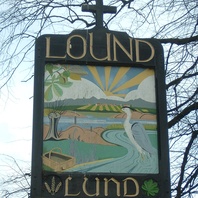
Viking Names
Lound
Lound, in the Bassetlaw Wapentake of Nottinghamshire, comes from the Old Norse element lundr ‘grove, wood’. This origin is celebrated on the village sign, and there is also a Grove Farm in the village.
Read More
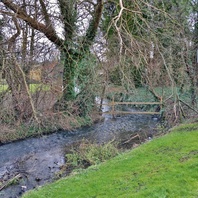
Viking Names
Nether Langwith
Nether Langwith, in the Bassetlaw Wapentake of Nottinghamshire, comes from Old Norse langr ‘long, tall’ and Old Norse vað ‘a ford’. The affix Nether ‘lower downstream’ distinguishes Nether Langwith from Upper Langwith, Derbyshire, further up the river Poulter.
Read More

Viking Names
Snitterby
Snitterby, in the Aslacoe Wapentake of Lincolnshire, is an Anglo-Scandinavian hybrid from the Old English unrecorded male personal name Snytra and Old Norse by ‘a farmstead, a village’. It is suggested that the personal name comes from Old English snotor, snytre ‘wise’. The same personal name has been attributed also to Snetterton, Norfolk.
Read More
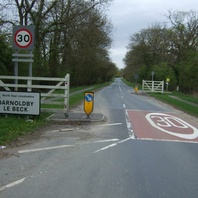
Viking Names
Barnoldby le Beck
Barnoldby le Beck, in the Haverstoe Wapentake of Lincolnshire, is a difficult name. The first element is likely from the Old Norse male personal name Bjǫrnúlfr, rather than the cognate Old English male personal name Beornwulf, especially taking into consideration the heavy Scandinavian influence in Lincolnshire. The second element is Old Norse by ‘a farmstead, a village’. The earliest reference to the Beck, from Old Norse bekkr ‘a stream, a beck’, is Barnoldby upon Becke 1662 Terrier.
Read More
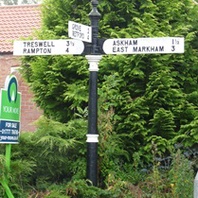
Viking Names
Askham
Askham, in the Bassetlaw Wapentake of Nottinghamshire, probably goes back to an original Old English æschām ‘ash tree farm,’ but the Old Norse cognate askr was substituted at an early date.
Read More

Viking Names
Tealby
Tealby, in the Walshcroft Wapentake of Lincolnshire, is a very difficult name. To explain the earliest recorded forms Tavelesbi and Tauelesbi in Domesday Book, it has been suggested that the first element contains the East Germanic group-name Taifali, Old English Taflas /Taeflas, detachments of whom are recorded as early as the fifth century. Possibly, this group retained their separate identity for some time in the post-Roman period. Thus, Tealby would originally have been a simplex form of the group-names Taflas /Taeflas, although simplex group-names are rare in English place-names. The second element Old Norse bý ‘a farmstead, a village’ was likely added to the simplex form after Scandinavian occupation of the area.
Read More

Viking Names
Car Colston
The first element of Colston, in the Bingham Wapentake of Nottinghamshire, is probably the Old Norse male personal name Kolr combined with the Old English element tun ‘an enclosure; a farmstead; a village; an estate’. Thus it is an Anglo-Scandinavian hybrid name. The later prefix Car was added to distinguish this from Colston Bassett. Early spellings suggest that this developed from Old Norse kirkja, ‘church’, in its Middle English form kirk(e). Later this was undoubtedly confused with the word carr (Middle English ker), ‘marshland’, common in Nottinghamshire place-names.
Read More

Viking Names
Conisholme
Conisholme, in the South Riding of Lindsey in Lincolnshire, comes from Old Danish kunung ‘a king’ and Old Norse holmr ‘an island, an inland promontory, raised ground in marsh, a river-meadow’. The name is topographically appropriate, though what king is evoked by it is uncertain. However, the village of Coningsby, also in the South Riding of Lindsey, is recorded in Domesday Book as having been owned by the king.
Read More
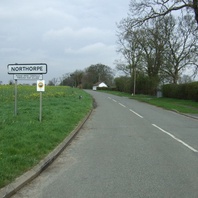
Viking Names
Northorpe
Northorpe, in the West Riding of Lindsey of Lincolnshire was originally a simplex place-name from Old Norse þorp ‘outlying farm, settlement’. Old English norð ‘north, northern’ was prefixed to distinguish Northorpe from Southorpe, which is now a deserted medieval village.
Read More

Viking Names
Perlethorpe
Perlethorpe, in the Bassetlaw Wapentake of Nottinghamshire, was originally a simplex name from the Old Norse element þorp ‘outlying farm, settlement’. The first element derives from the family name Peverel and was added at a later date possibly because the estate became associated with this family. Perlethorpe is a joint parish with Budby.
